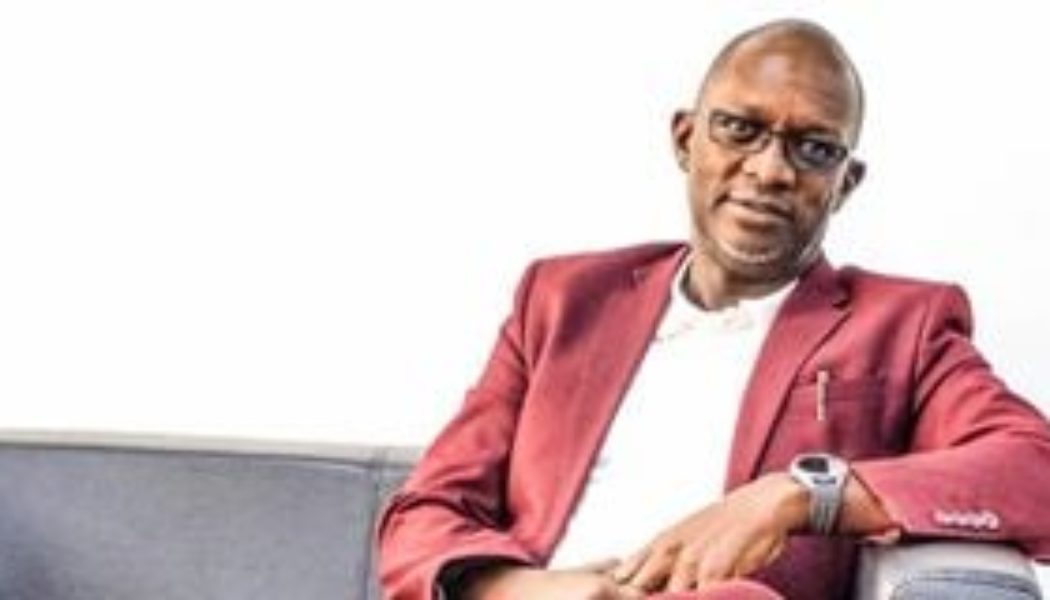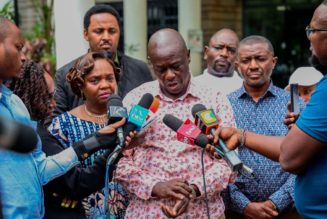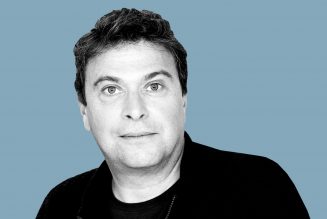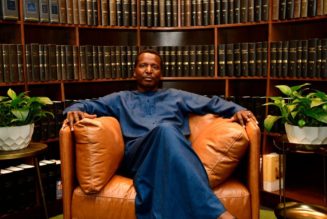Who was it who said ‘The well-dressed man is he whose clothes you never notice?’ That might not necessarily be true for Martin R Ochieng, the Group Managing Director of Sasini. You’d have to be blind not to notice his impeccable suit and the elegance with which he wears it. However, what pours out of this suit, out of him, is something that you might struggle to place a firm finger on, especially if you meet him for only an hour. There are bright sparks of confidence that sometimes emit flashes of pride which often might sound like the great Cannon sounds of hubris.
What you will not confuse, though, is his firm stand on issues, no matter how unconventional they may be. “I’m very decisive, once I decide on what I want, nothing else matters.” He says. “I have no apology to give for choosing [those] philosophies of life that guide the way I live now.”
He’s definitely a Type A personality: First Class Honours, Bachelor of Science from Moi University, a Master in business and strategic marketing from Oxford Brookes University, and a career in international trade, business management, and leadership spanning 25 years, twenty of which were spent in South Africa.
At 55 years of age and with numerous notches on his career belt, Mr Ochieng is undergoing what he calls “Midlife Excellence.” Not to be confused with a midlife crisis.
If you had a chance to be a whale or a lion, which would you be?
An elephant! Or a cheetah. Those are the animals that have guided my thinking through life. A whale is too big an animal for me to relate to and a lion is way too forward. I’ve always seen the elephant not for its size, but more for its humility because it’s one of those animals that doesn’t flaunt that size. And so as big and as influential as it is in nature, it’s very humble until you poke it. Then a cheetah, which is something I learned from my father when I was in primary school. It’s the only animal that when scared doesn’t show its fear. He stands there and looks at you and doesn’t make a move until you do. And I found that to be very useful in my personal and corporate life. Don’t show panic. Be calm.
When in your career did you feel extremely panicked?
[Pause] I have to think about that. [Pause] To be honest I think that I learned very early on that panic offers no options for solutions. I tend to want to take time with decisions that are big and that would call for a reaction that may be classified as panic. I’m very decisive – it’s one of my key attributes. However, I might have faced a panic when I left the corporate world to go into consulting a few years back in 2014. I made the switch because I was going through so much. I travelled a lot in a huge geographical area I was responsible for. I was living in Cape Town and had been there for two decades. I ended up in a consulting firm, giving part of my time to help different clients with aspects of strategy, executive coaching, and mentoring, which I did between 2015 and 2016 before I decided to return to corporate. I’m a corporate animal.
What kind of a guy is your father?
We lost him in October 1991. He got sick with cancer and died within three years. So that wasn’t nice. He is very influential in the things I do. I am the firstborn and the only boy in a family of four children. He taught me to treat other people the same way I was treated. And this was about my sisters specifically, because we grew up in a patriarchal society.
And so he took it upon himself to show me, by how he treated mom and how he wanted me to treat my sisters, that there was nothing special about me just because I was a boy. That lesson has guided my focus on gender issues in the workplace. The other lesson was just the concept of timekeeping and respecting time, you know, people’s time and your own. He was very strict in that aspect.
If you had no fear of failure, what’s the one thing you would do?
That’s an easy question for me to answer. I have no fear because when I’ve tried things and failed, I’ve learned more from my failures than my successes. For a long time, I had a fear of heights. But I have since conquered it by jumping off cliffs, and waterfalls, and being on helicopter rides in the Victoria Falls canyon.
The most difficult thing I’ve done in my life is getting divorced. I don’t talk about it much because that’s not a good experience but I went through it and came out on the other side stronger and there for the family. Such difficulties teach you different lessons. I am of an old school of thought that says marriage should be for life but if it’s not working, for whatever reason, you need to face that reality and decide whether you want to continue.
How did your divorce alter you?
It alters you especially if you view it as a failure. For me, it humbled me. I was heavily corporate at the time, and I still am, and travel and dedication to work meant that I didn’t give as much attention to the family as I should have. And in a way, that’s my way of taking responsibility for that. It’s a character-building event in one’s life. I don’t care who you are if you get married and you live two decades with one person when you do come to a point where you have to leave that marriage, it’s a big event that alters you. You need to pick up so you don’t make the same mistakes you made.
What were your top three lessons?
First, focus more on what you can do for others. Be less selfish. Secondly, children come first. I learned very quickly how critical my children were at the time. Thirdly, it’s difficult as a young person to commit to certain aspects of life, for life. The whole concept of marriage is a bit misguided. You meet this stranger, get married and society tells you it is for life. I don’t think you can commit that way, not until you’ve lived with that person for several years to understand why, and what they truly care about, and for them to understand what you truly are about. Only then can you make those commitments. And even when you have that understanding, it’s still difficult. My advice now to young couples is, yes, commit but whether you should commit for life or not is a personal issue.
You remarried?
Yes, I remarried. It’s difficult to live on your own. You do need companionship, whether it’s for intellectual activity or other things. But, you know, the whole marital thing, I have misgivings around the way society approaches that subject because I don’t think that any one solution is relevant for everybody. And so people have to look at this thing from a personal, individualistic perspective.
You’d offer great premarital counselling
I doubt it. I don’t know enough. We live in a society that considers lifelong commitment to marriage a success and anybody who’s been divorced is seen as a failure. These are things we are conditioned to believe while growing up but we should question them when we get to adulthood. And not just about marriage; about life and religion.
I don’t think there’s a generic answer for everyone. It depends on two individuals and what they call marriage and how they want to treat it.
What’s the most difficult thing you’ve had to learn lately?
I don’t know. I look for failure because I find lessons in things that don’t go as you expect them to. There’s very little that you learn from being successful. I remember vividly falling off a bicycle as a young boy trying to learn how to ride. But I never got discouraged because the person teaching me didn’t give me the chance to give up. So I learned more lessons. When I try something and I don’t succeed at it I know why I didn’t succeed and I can carry that into the next aspect of my life.
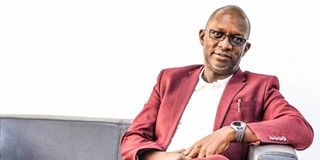
Sasini Plc Group Managing Director Martin Ochien’g during the interview on June 10, 2024 in Nairobi.
Photo credit: Billy Ogada | Nation Media Group
What moves you now?
I’m generally unmoved in life. I have certain principles I don’t have to convince people about. A lot of them go against what society expects because of the choices I’ve made in my life. I’m very selfish, not in the societal definition of that word, but from the perspective of caring about myself first. I don’t believe I can care about others if I don’t care about myself.
This mentality has always allowed me to focus on my success before I can share that success with others. I have learned to think through difficult issues and make decisions quickly. I’m very decisive. I make decisions very quickly, and it doesn’t matter whether they are wrong or not. If they are, I can change them. I don’t procrastinate and I delegate easily.
What personal flaws do you find that you need to work on?
I don’t see myself having flaws because that would mean I have self-doubt. Whatever I do, whether I get a positive or a negative reaction from people around me, works for me. If it doesn’t work for you, that’s not my problem. Of course, I don’t live in isolation and therefore, I am cognisant of society. But that doesn’t mean I please everyone. Whether you have a philosophy in life or not, you cannot approach life with wanting to be good and to please everybody. It gives me so much joy that whatever I’m doing, whether I’m doing it alone or with people, as long as it pleases me, that’s what I do.
Would you say you’re proud or confident?
I think that I’m natural in the way I communicate and think. I have no apology to give for choosing the philosophies that guide the way I live. I would say I’m both proud and confident. I don’t think they’re mutually exclusive when it comes to me. I’m proud in the sense that I know what I don’t want and once I make that decision, to get it, nothing else matters irrespective of what people tell me and think about it. Over the years, the results have proven that that’s the way to approach life. I’ve never regretted decisions I’ve made, especially major decisions, because I found that they worked for me. They didn’t necessarily work for everybody else.
What are some of the prominent things you’re going through now in your mid-50s?
Nothing major. Just enjoying life; work, gym, outdoor activities, cycling, off-roading, camping, alone or with friends. I’m in a mid-life of excellence because midlife does not necessarily relate to crisis. Not everybody goes through a loss of confidence in midlife that allows or leads them to make different decisions. I’m experiencing a certain level of success. And it’s not professional or financial or social or family. It’s all those things. So, when I look at my life today, is there anything I want that I don’t have? I doubt it.
Are there insights on fatherhood that you can share, perhaps parts you struggle with?
Different fathers do different things for their children and so I’m usually careful not to say what a good father looks like. I think fatherhood or parenthood generally calls for specific reactions to specific issues. I haven’t faced every aspect of life that a father would face so if somebody asked me, ‘What do I do with a child who comes home having done drugs?’ I wouldn’t know what to advise because I’ve been lucky not to face that scenario. As long as you approach every parental situation with love, affection and understanding, you will have solutions. If you want to be influential in your children’s lives, I believe you do it before they turn 14.
Why do you wear two rings on the same finger?
It’s just fashion. One is a wedding ring and one is just a ring. I like the colour black.
Where did you grow up?
All over. In Kenya, Nairobi, Murang’a, Nyeri, Kisumu. My folks were moving around for work and so we followed them. And so I think my upbringing does have a little bit of those aspects of societies I was exposed to, something I’m very grateful for.
